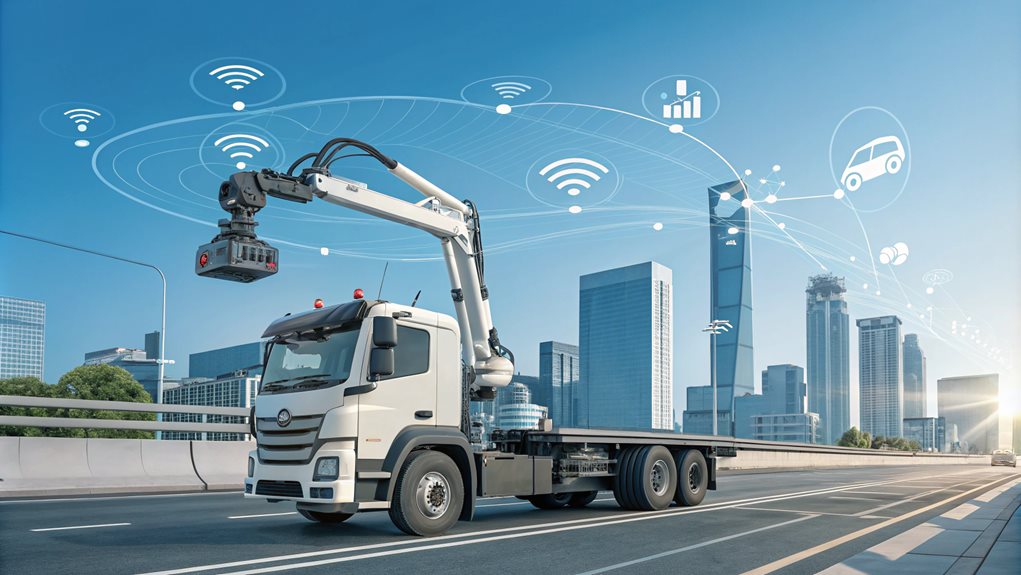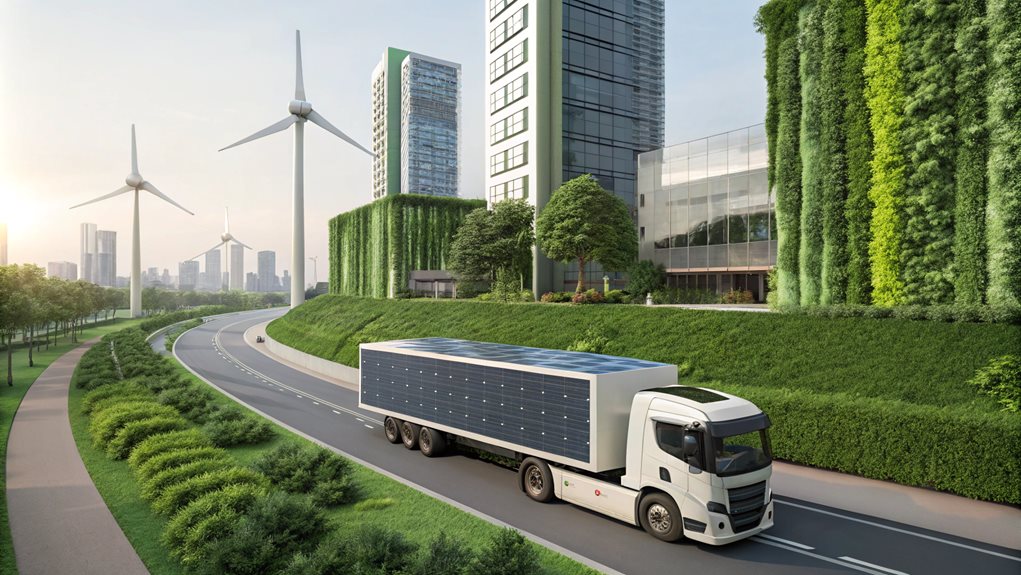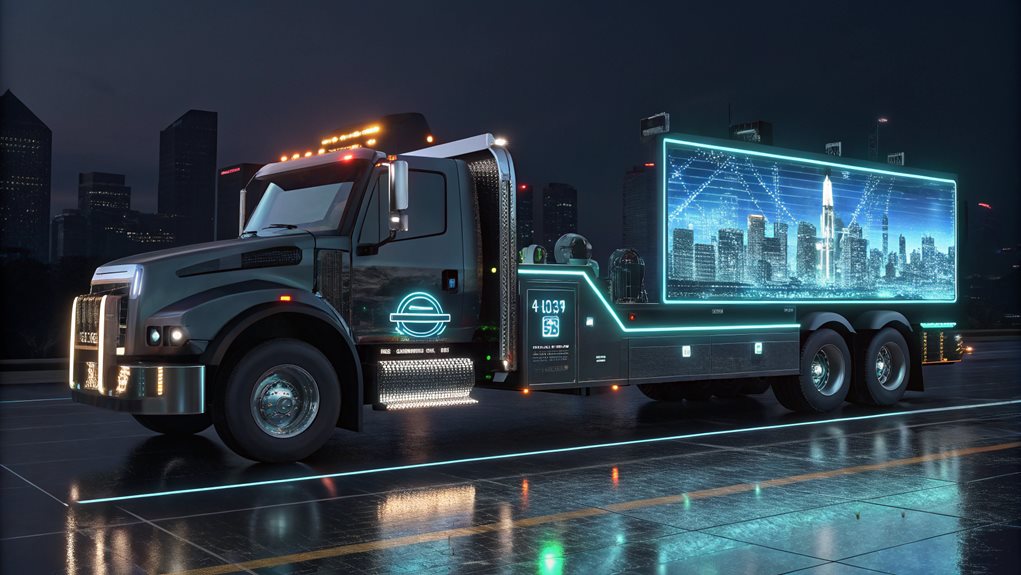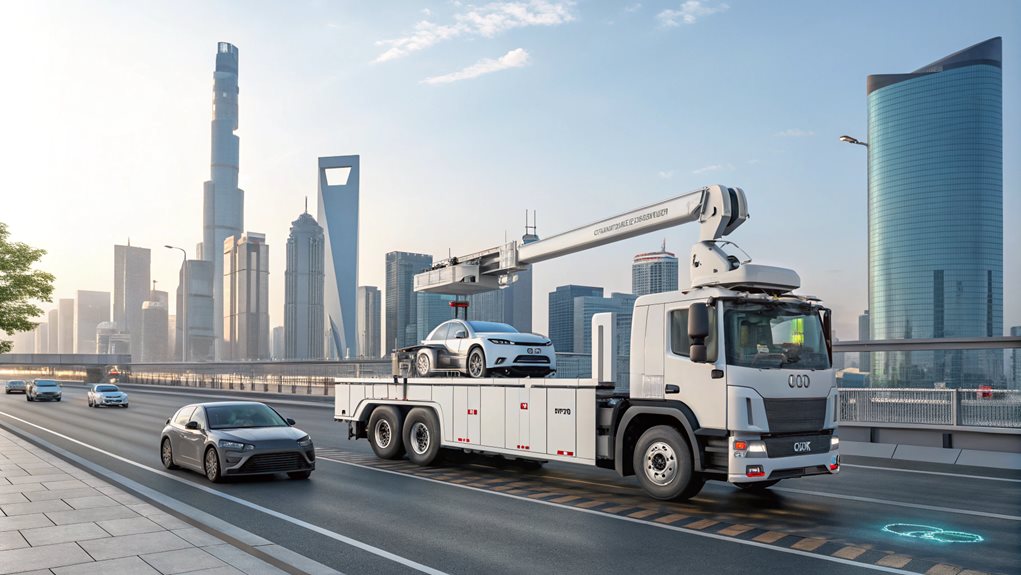The future of towing services is poised for considerable transformation, driven by technological breakthroughs and eco-friendly innovations. Automation in dispatch systems, enhanced GPS tracking, and AI-optimized routing are streamlining operations and improving response times. Autonomous tow trucks, equipped with advanced sensors and neural computing, promise increased safety and efficiency. Eco-conscious practices are gaining traction, with electric and hybrid tow trucks reducing emissions and operational costs. Customer interactions are also evolving through real-time tracking, IoT-powered safety systems, and seamless payment options, enhancing overall service experience. The integration of such advanced technologies and sustainable practices signifies a progressive direction in towing service evolution, offering further insights for those seeking thorough understanding.
Expert Highlights
- Autonomous tow trucks with AI-driven automation reduce response times and improve precision.
- Eco-friendly towing solutions utilize electric and hybrid vehicles to lower emissions.
- Advanced technologies enable real-time tracking and optimized route management for faster service.
- Customer experience is enhanced through seamless communication, real-time updates, and customizable services.
- EV-specific towing includes specialized equipment, mobile charging, and technician training for efficient service.
Technological Breakthroughs in Towing

In the ever-evolving landscape of towing services, technological advancements are playing a pivotal role in redefining operational efficiency and customer satisfaction. Automated dispatch systems are central to this transformation, streamlining operations by reducing response times and eradicating communication delays. These systems promptly assign the closest available units, fostering immediate support. For instance, with automated dispatch systems, delays caused by manual processing are virtually eliminated, ensuring quick and precise deployment of towing assistance. The integration of GPS tracking and telematics systems into tow trucks enables real-time vehicle location monitoring, further optimizing dispatching and routing.
Additionally, integrated dispatching software facilitates real-time tracking and job assignments, enhancing coordination among dispatchers, drivers, and patrons, thereby cultivating a sense of reliability and belonging for customers. Complementing these systems, mobile devices confirm seamless communication, delivering update notifications on service statuses and minimizing potential delays. Likewise, GPS tracking and advanced fleet management contribute greatly, allowing precise vehicle location monitoring, optimizing routes, and ultimately improving response times and enhancing the overall towing experience. It is essential to ensure drivers are both professional and experienced, with appropriate training and familiar
Rise of Autonomous Tow Trucks
As the towing industry embraces innovation, autonomous tow trucks are at the forefront of transforming operational efficiency, primarily through the integration of advanced sensor technologies and AI-driven automation. By leveraging sophisticated control and sensing systems, these cutting-edge vehicles guarantee enhanced precision and safety, vastly reducing human error in complex and dynamic environments. The application of AI not only optimizes route management and load handling but also streamlines logistics processes, presenting a compelling case for industry's future reliance on autonomous solutions. For emergency roadside help, autonomous systems could respond swiftly to service requests, enhancing overall reliability and support. Two British companies, Fusion Processing and Bradshaw Electric Vehicles, are collaborating to develop fully autonomous Tow Tractors that will improve safety and operational efficiencies in industries such as factories, warehouses, and airports, with plans for commercial use by the next year.
Advanced Sensor Integration
Autonomous tow trucks represent a transformative shift in the towing industry, driven by the integration of advanced sensor technologies. These technologies include Lidar and camera sensors for real-time processing and navigation, thermal image processing for enhanced environment detection, and neural computing units for data processing. Such innovations guarantee precise localization and route planning via 3D digital maps, empowering tow trucks to navigate complex environments with centimeter-level accuracy. With the precise and safe autonomous driving capabilities of Thor Autonomous Suite for Tow Tractor, efficiencies in tow operations are significantly enhanced. Remarkably, integration with fleet management ensures seamless operation in industrial settings, enhancing safety through collision avoidance and advanced braking systems. Additionally, operational efficiency is optimized by connected sensing infrastructures, allowing robust data collection in real-time.
AI-Driven Automation
The rise of autonomous tow trucks marks a significant evolution in the towing industry, spearheaded by revolutionary AI-driven automation. These advanced vehicles autonomously navigate through traffic, optimizing routes with minimal human intervention by analyzing real-time data on traffic patterns and weather conditions.
This results not only in reduced response times during emergencies but also in fuel consumption savings and enhanced service efficiency. Additionally, the AI systems integrated within these trucks enhance safety by detecting potential road hazards and maintaining safe distances from traffic, all while adhering to strict lane boundaries.
In addition, these autonomous solutions increase operational efficiency and enable seamless integration and scalability, allowing fleets to operate smoothly and expand without extensive new investments, consequently positioning businesses for sustainable future growth.
Human Error Reduction
Driven by the increasing demand for precision and safety, autonomous tow trucks have emerged as a solution to drastically reduce human error in the towing industry. Utilizing a combination of advanced sensors, cameras, and AI-driven systems, these vehicles not only navigate efficiently but also engage in safe towing operations independently. Their integration marks a significant advancement in reducing the dependency on human intervention, resulting in enhanced service efficacy.
The benefits of autonomous towing can be summarized as follows:
- Precision Operations: Advanced technologies guarantee accurate towing processes, reducing human error.
- Optimized Routing: Communication with traffic systems decreases delays.
- Safety Enhancements: Collision avoidance systems safeguard all road users.
- 24/7 Operations: Continuous service availability improves response time and efficiency.
These innovations foster a safer, more efficient towing environment for all communities.
Eco-Friendly Towing Solutions

As the towing industry advances towards sustainability, zero-emission tow trucks and sustainable fuel alternatives present significant opportunities for reducing environmental impact while maintaining operational efficiency. Electric and hybrid towing vehicles not only lower emissions but also provide long-term cost savings and fuel efficiency, complemented by innovative energy solutions such as biodiesel and solar power. Additionally, eco-conscious recovery practices, including the use of regenerative braking systems and biodegradable lubricants, align with global efforts to decrease the carbon footprint and promote environmentally responsible operations. To ensure quick response times and effective service, Minnesota's roadside assistance providers have strategically placed dispatch centers throughout the state, ensuring efficient coverage for eco-friendly towing services.
Zero Emission Tow Trucks
Zero Emission Tow Trucks represent a pivotal transformation in the towing industry as it embraces eco-friendly solutions to meet evolving environmental standards. These advanced vehicles are at the forefront due to technological and regulatory advances aimed at reducing emissions.
Governments are facilitating this shift through incentives such as subsidies and tax breaks, complemented by emission standards and procurement targets.
Battery and fuel cell innovations are making zero-emission trucks more viable by enhancing energy density and reducing costs.
An expanding variety of over 300 electric and hydrogen models reflects growing demand as providers commit to decarbonization.
Significant investment, including $450 billion, is crucial to develop the necessary charging and production infrastructure.
These strides collectively reinforce a sustainable towing future.
Sustainable Fuel Alternatives
The towing industry is increasingly adopting sustainable fuel alternatives as part of a broader strategy to reduce its ecological footprint and comply with stringent environmental regulations. Hybrid and electric vehicles are leading this transformation, as they deliver significant reductions in emissions while enhancing fuel efficiency.
Additionally, alternative fuels such as natural gas, propane, biodiesel, and renewable diesel are being explored and implemented, offering promising paths toward sustainable operations. These fuels aid towing services in adhering to environmental standards and regulatory compliance.
With advanced features, these alternative fuel vehicles guarantee lower greenhouse gas emissions. Moreover, proper fleet maintenance, including regular engine tuning and route optimization, complements these efforts. Together, these initiatives foster a responsible industry that values both performance and environmental stewardship.
Eco-Conscious Recovery Practices
Electric tow trucks are spearheading a transformative shift towards eco-conscious recovery practices in the towing industry. These vehicles offer a range of environmental and operational benefits that not only position businesses as green leaders but also resonate with communities valuing sustainable solutions.
Key innovations include:
- Eco-Friendly Towing Vehicles: Electric and hybrid tow trucks eliminate or reduce emissions, bolstered by advanced battery technologies and regenerative braking systems.
- Innovative Operational Technologies: Route optimization and smart towing management minimize unnecessary idling and emissions.
- Eco-Friendly Towing Practices: Specialized equipment like soft straps and proper battery management protect vehicles and the environment.
- Community and Regulatory Compliance: Achieving green certifications and recycling waste align businesses with community standards.
These advancements reflect a commitment to the environment, appealing to the growing eco-conscious demographic.
Heavy-Duty Towing Advancements
As the landscape of towing services continues to evolve, heavy-duty towing advancements are at the forefront of this transformation, driven by groundbreaking technological integration. Telematics and GPS technologies facilitate real-time tracking of towing vehicles and assets, enhancing operational efficiency and safety. IoT devices connect pivotal truck components, providing essential data on vehicle health, load conditions, and environmental factors. Advanced diagnostic tools streamline operations by offering real-time insights. In addition, semi-autonomous features, such as automatic braking, enhance the safety and reliability of tow trucks. A vital aspect of modern services is 24/7 emergency car jump start(Roadside Assistance) service, ensuring quick and efficient roadside assistance. The emergence of autonomous systems, with developments in autonomous tow trucks and trailer maneuvering, promises to further reduce human intervention. These advancements collectively define a future-oriented, efficient, and technologically adept heavy-duty towing sector.
Enhancing Customer Experience

In today's competitive towing industry, enhancing the customer experience is paramount to success and differentiation. The integration of real-time communication and transparency fosters trust and reduces customer anxiety by ensuring they receive accurate updates during the towing process. Mobile platforms further advance personalized and convenient services, providing benefits such as:
- Customization: Customers tailor service preferences, including tow types and assistance options.
- Instantaneous Response: On-demand services deliver rapid engagement, minimizing wait times.
- Seamless Transactions: Digital payment systems streamline transactions, promoting ease of use.
- Feedback Channels: Platforms for ratings and reviews catalyze continuous service improvement.
Additionally, many services now offer tire change service and other roadside assistance, providing customers with comprehensive solutions for various road emergencies.
Towing Innovations for Electric Cars
As the adoption of electric vehicles (EVs) continues to rise, towing services must innovate specialized equipment and mobile charging solutions to effectively support this evolving landscape.
The integration of flatbed tow trucks designed for EVs, due to the unique challenges posed by their high-voltage systems and lower center of gravity, guarantees safe transport without risking potential damage.
Additionally, the deployment of advanced tow trucks equipped with mobile charging capabilities caters to the significant reduction in range that electric vehicles experience during towing, providing essential power during transit and enhancing customer satisfaction.
In areas like Dinkytown MN, known for its vibrant community near the University of Minnesota campus, the need for roadside assistance services such as charger deliveries and EV towing becomes ever more critical.
Specialized EV Towing Equipment
Electric vehicles (EVs) necessitate a shift in traditional towing techniques due to their unique structure and electrical systems. The specific needs EVs present require specialized towing equipment and methods. Many EVs have low ground clearance, making traditional towing methods unsuitable. Instead, wheel-lift or flatbed tow trucks are recommended.
To successfully tow EVs, it's critical to understand their intricate electrical systems and utilize the correct equipment:
- Proper harnesses and lifting points guarantee EVs are secured without incurring damage.
- Insulated tools and personal protective equipment (PPE) are crucial when handling high-voltage components.
- Knowledge of EV battery systems' locations and secure disconnection is essential.
- Training for technicians on EV-specific towing guarantees both safety and compatibility.
This specialized approach enhances safety and performance in towing.
Mobile Charging Solutions
With the rapid increase in electric vehicle (EV) adoption, mobile charging solutions are becoming essential for efficient and flexible roadside assistance. Innovations such as battery-powered chargers and hydraulic generators are redefining the landscape.
SparkCharge's Roadie Portable, with its grid-free DC fast charging, provides one mile of range per minute, compatible with all EV models. Meanwhile, Dynaset's hydraulic generators utilize the towing vehicle's engine to deliver up to 40 kW of power.
Off-grid solutions like the Voltstack Mobile EV Charger offer silent, emissions-free charging anywhere, charging multiple vehicles simultaneously. These scalable solutions integrate software like NeuronOS™ for precise control, ensuring readiness to quickly return EVs to the road.
Smart Equipment Integration

The future of towing services is being reshaped by sophisticated smart equipment integration, seamlessly combining advanced technologies with traditional practices to verify operations. This evolution is driven by several innovations designed to enhance efficiency and safety within the industry.
GPS provides precise location services and efficient routing, helping operators reduce response times and fuel costs.
IoT-powered systems guarantee safe towing operations through vehicle identification and continuous monitoring.
Innovative hydraulic systems and advanced winch technology allow for swift, damage-free loading and unloading.
Driver assistance, automated diagnostics, and remotely controlled operations elevate operator safety and overall service reliability.
These integrations offer tow companies a competitive edge, fostering community trust and belonging by consistently delivering superior service.
Mobile Apps in Towing Services
Gone are the days of tedious and time-consuming phone calls to request towing services; now, mobile apps have transformed the industry by delivering unprecedented convenience and accessibility. With a few taps on a smartphone, drivers can effortlessly request assistance, share location details, and specify their vehicle issues, ensuring rapid responses in urgent scenarios.
Real-time tracking provides peace of mind by offering updates on the dispatched tow truck's location and estimated arrival time. Additionally, customization options allow drivers to select services like flatbed towing or roadside support, tailored to their unique needs.
Seamless payment solutions further enhance the experience by facilitating secure, digital financial transactions. These advancements collectively elevate customer satisfaction while also streamlining operations for towing companies, fostering a stronger service community.
Advanced Safety Systems

In the rapidly evolving landscape of towing services, advanced safety systems represent a pivotal innovation ensuring enhanced security and reliability for both the operator and the client. These systems integrate cutting-edge technology to address key safety elements:
- Advanced Braking and Stability Systems: Features like Anti-Lock Braking (ABS), sway mitigation, and integrated electric brake controllers enhance traction and stability.
- Enhanced Visibility and Awareness: Surround view cameras, trailer blind spot monitoring, and invisible trailer views aid in obstacle detection and safe maneuvering.
- Real-Time Alerting and Monitoring: Technologies such as digital alerting and trailer tire pressure monitoring provide essential updates for proactive safety checks.
- Automated and Assistive Towing Features: Innovations like automatic hitch assist and pro trailer backup assist streamline complex towing maneuvers, fostering efficiency.
Sustainable Practices in Towing
As the towing industry pivots towards sustainability, embracing eco-friendly practices has become integral to its evolution. By adopting clean propulsion technologies, companies are reducing emissions via innovative solutions like electric and hybrid vehicles, while utilizing alternative fuels such as LNG and biodiesel. Efficient route planning is another cornerstone, leveraging GPS and real-time data for optimized fuel efficiency. Regulatory compliance and environmental stewardship further underpin these efforts, with strategies that span responsible waste disposal to community engagement. Eco-friendly maintenance is fostered through biodegradable products and solar-powered equipment.
| Eco-Friendly Fuels | Efficient Routes | Compliance & Maintenance |
|---|---|---|
| LNG | GPS Optimization | Regulatory Compliance |
| Electric Propulsion | Reduced Idling | Responsible Waste Disposal |
| Hybrid Vehicles | Proper Loading Techniques | Biodegradable Products |
| Biodiesel | Steady Speeds | Solar-Powered Equipment |
This transformation fosters a collective commitment to a greener future.
Roadside Assistance FAQ
How Will Towing Companies Address Potential Job Loss Due to Automation?
Towing companies can address potential job loss from automation by investing in reskilling programs, ensuring workforce adaptation to emerging technologies. Emphasizing human-centric skills, they can create roles in AI maintenance and strategic operations, balancing innovation with employee well-being.
What Are the Costs Associated With Implementing These New Towing Technologies?
Implementing new towing technologies entails hardware and software investments, electric vehicle acquisition, training costs, infrastructure upgrades, and R&D. Additional expenses include maintenance, insurance, compliance, customer service enhancements, environmental assessments, and sustainable practice implementation.
How Will Insurance Policies Change With the Adoption of Autonomous Tow Trucks?
With autonomous tow trucks, insurance policies will likely pivot towards hybrid models combining auto and product liability coverage. Policy language adjustments will address technology risks, while premiums might increase due to uncertainties in autonomous vehicle operation and liability.
What Is the Expected Timeline for Fully Autonomous Towing to Become Mainstream?
The timeline for fully autonomous towing to become mainstream is anticipated to align with broader autonomous vehicle trends, with initial deployments by 2025 and gradual integration into mainstream operations expected by 2030, fostering enhanced community safety and efficiency.
Will These Advancements Lead to Increased Towing Fees for Consumers?
Technological advancements, eco-friendly initiatives, and compliance with safety regulations are likely to elevate towing fees. While these improvements boost service quality and sustainability, the initial investment and operational costs could result in higher consumer fees.
